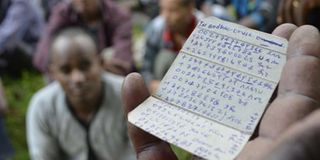Kenya's efforts to combat human trafficking at risk over unstable neighbours - report

A list of contacts found with Ethiopians arrested in Kiambu County in July, 2014 and suspected to be victims of human trafficking. Kenya’s unstable neighbours could hamper the country’s efforts to combat human trafficking, a new report says. FILE PHOTO | NATION MEDIA GROUP
What you need to know:
- IOM, a UN body charged with managing international migration and reducing cases of migrant exploitation, says the eastern Africa region faces challenges because of political instability.
- The country had been on the Tier 2 Watch List for trafficking for the past three years for failing to make serious efforts to deal with the problem.
- Tanzania and Djibouti are still on the Watch List while conflict-hit South Sudan and Somalia are in Tier 3, meaning little is being done there to combat human trafficking.
Kenya’s unstable neighbours and low number of jobs created domestically could hamper the country’s efforts to combat human trafficking.
A new briefing note by the International Organisation for Migration (IOM) warns that counter-trafficking policies must be part of efforts to secure the region already fraught with political violence.
“TiP [trafficking in persons] does not suddenly manifest itself in an isolated situation. The links between the vulnerability of populations and exploitive practices which existed prior to a crisis need to be factored into a humanitarian response,” IOM researchers observe in a document titled, Addressing Human Trafficking and Exploitation in Times of Crisis.
IOM, a UN body charged with managing international migration and reducing cases of exploiting migrants, says the eastern Africa region faces challenges because of political instability and lack of alternative opportunities to earn income.
The document, published ahead of the World Day against Trafficking in Persons, comes a day after the US Department of State raised Kenya’s counter-trafficking ranking from Tier 2 Watch List to Tier 2.
Though Kenya is still considered a source, transit point and destination for trafficked human beings, its situation improved last year following the passage of the Victim Protection Act, which improves support for trafficked victims and provides for the establishment of a support fund.
The country had been on the Tier 2 Watch List for trafficking for the past three years for failing to make serious efforts to deal with the problem, in spite of passing the Counter Trafficking in Persons Act in 2012.
With the Victims Protection Act, lawyers representing victims can address the court to strengthen the case and may introduce new evidence to buttress prosecutors' proof as opposed to before when victims were silent listeners to proceedings.
ADVISORY COMMITTEE
In addition, Kenya created an anti-human trafficking advisory committee to update its national policies. Besides, there were 65 prosecutions and 33 convictions, an improvement on the previous record by nearly twice the number, according to the Department of State.
However, such efforts could be diluted by the violence going on in countries neighbouring Kenya.
In the region, Kenya, Uganda and Ethiopia are on Tier 2.
Tanzania and Djibouti are still on the Watch List while conflict-hit South Sudan and Somalia are in Tier 3, meaning little is being done there to combat human trafficking.
“Implementing the NPA (National Plan of Action) especially by mapping out the hotspot will ensure Kenyans are protected.
"The hotspots include the porous border areas of Tanzania,” Ms Prudence Mutiso, a legal officer at Cradle-Kenya, told the Nation.
Cradle is a local organisation involved in defending children’s rights, including those rescued from trafficking.
IOM argues conflict turns people in these countries into helpless refugees who can fall for any trap to get out of their war-torn countries.
In stable countries like Kenya, IOM says, the refugees may still be trafficked because there are few employment opportunities to discourage the vice.
“Many states do not have (counter-trafficking) legislation or other measures in place to reduce vulnerability to trafficking and to address the protection needs of populations at risks.
“Lack of awareness on the dangers of involvement in the trafficking business and the lack of alternative livelihood opportunities in countries of transit encourage young people to get involved in these criminal activities,” the brief states.





